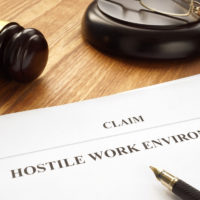Courts Continue To Dismiss Hostile Work Environment Harassment Cases By Ignoring Supreme Court Precedent

Under Title VII of the Civil Rights Act of 1964 (Title VII), it is an unlawful employment practice for an employer to discriminate against any individual with respect to his or her compensation, terms, conditions, or privileges of employment because of such individual’s sex. Sexual harassment is a form of sex discrimination prohibited by Title VII. Consequently, an employee may establish a violation of Title VII by showing that discrimination based on sex has created a hostile or abusive work environment.
Supreme Court Standard
In Meritor Savings Bank, FSB v. Vinson, 477 U.S. 57 (1986), the U.S. Supreme Court held that sexual harassment so “severe or pervasive” as to “alter the conditions of [the victim’s] employment and create an abusive working environment” violates Title VII. In Harris v. Forklift Systems, Inc., 510 U.S. 24 (1993), the Supreme Court reinforced this holding by stating that sexual harassment “that is sufficiently severe or pervasive to alter the conditions of the victim’s employment and create an abusive working environment” violates Title VII. The Harris Court further stated that “[c]onduct that is not severe or pervasive enough to create an objectively hostile work environment—an environment that a reasonable person would find hostile or abusive—is beyond Title VII’s purview.”
Harassment Need Not Be Both Severe & Pervasive
In applying Supreme Court precedent, courts have acknowledged that the standard for an actionable hostile work environment is whether the sexual harassment was sufficiently severe or pervasive to alter the conditions of the victim’s employment and create a hostile or abusive working environment. Thus, as explained by the U.S. Seventh Circuit Court of Appeals in Cerros v. Steel Tech., Inc., 398 F.3d 944 (7th Cir. 2005), “conduct that is either pervasive or severe may give rise to a hostile work environment.” Indeed, as observed by the Seventh Circuit in Worth v. Tyer, 276 F.3d 249 (7th Cir. 2001), “harassment need not be both severe and pervasive to impose liability: one or other will do.” “[T]he more severe the conduct,” as noted by the U.S. District Court for Maryland in Reed v. Airtran Airways, 531 F.Supp.2d 660 (D. Md. 2008), “the less pervasive the [victim] need prove that it is.” Consequently, as pointed out by the Seventh Circuit in Hostetler v. Quality Dining, Inc., 218 F.3d 798 (7th Cir. 2000), courts have “repeatedly recognized that even one act of harassment will suffice if it is egregious.”
Courts Disregard Supreme Court Standard
Despite the Supreme Court’s mandate that sexual harassment need not be both severe and pervasive to create an actionable hostile work environment, our Marion County, Florida hostile work environment harassment attorneys have learned that some courts ignore Supreme Court precedent and expressly require the harassment to be both severe and pervasive. For example, the U.S. District Court for the Southern District of Iowa in Wilson v. City of Des Moines, 338 F.Supp.2d 1008 (S.D. Iowa 2004), declared that the “Supreme Court has held that sexual harassment that is so severe and pervasive to alter the conditions of employment, thereby creating a hostile or abusive work environment violates Title VII.” By way of another example, the Seventh Circuit in Hrokowski v. Worthington Steel Co., 358 F.3d 473 (7th Cir. 2004) reversed the dismissal of a hostile work environment harassment claim because the district court “based its analysis on the erroneous premise that the harassing words or conduct had to be both severe and pervasive.”
In a more recent decision, the Seventh Circuit in Robinson v. Perales, 2018 WL 3214297 (7th Cir. July 2, 2018) reversed the dismissal of a hostile work environment harassment claim because the district court “misstated the applicable legal standard [by] declaring that the conduct at issue must be severe and pervasive rather than severe or pervasive.” As the Robinson court explained in reversing the district court’s fundamental legal error and failure to account for binding Supreme Court precedent, the “requirement” for establishing a hostile work environment claim “is disjunctive, not conjunctive; the standard may be met by a single extremely serious act of harassment or by a series of less severe acts.”
Free Consultation With Marion County Harassment Lawyers
Based in Ocala, Florida and representing employees throughout Central Florida, we have been in the trenches for almost twenty years fighting for the rights of employees who have been subjected to hostile work environment harassment. If you have experienced hostile work environment harassment at work or have questions about what is required to bring a hostile work environment harassment claim, please contact our office for a free consultation with our Marion County, Florida sexual harassment attorneys. Our employee rights law firm takes hostile work environment harassment cases on a contingency fee basis. This means that there are no attorney’s fees incurred unless there is a recovery and our attorney’s fees come solely from the monetary award that you recover.


 Close Menu
Close Menu